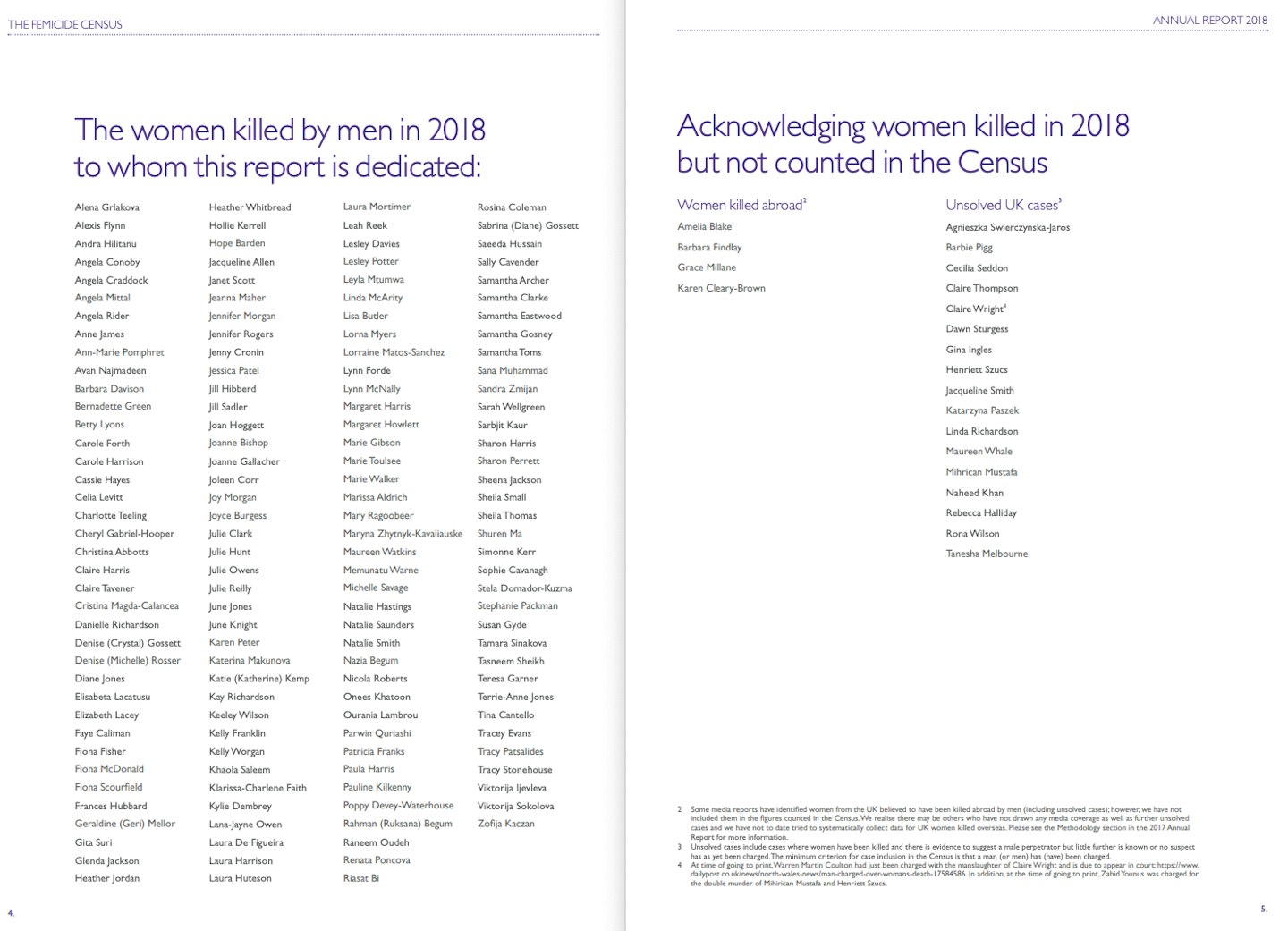The founder of a census into the deaths of women and girls aged over 14 says politicians need to ‘pull [their] finger out’ to address the problem of male violence against women.
Karen Ingala Smith spoke to Grazia as the fourth annual Femicide Census was released and found that more than half of women killed by men in 2018 were killed by a current or former partner.
It found that in the UK in 2018, 149 women were killed by 147 men – an increase of 10 from the previous year and the highest number so far. Of those women, 91 (61 per cent) were killed by current or former partners. In half of the cases, the men had previous histories of violence – and three had killed before. Only six per cent of murders were committed by a stranger.
The study also found 41 per cent of those killed by a current or former partner had left or were in the process of leaving – 30 per cent of these were killed within the first month, 70 per cent within the first year. The majority of killings (68 per cent) occurred in or immediately around the woman’s house. They’re chilling statistics, especially in the context of the news that Women’s Aid recently found 64 per cent of all referrals to refuges were declined.
Asked what she thought needed to be done, Karen – Chief Executive of a domestic violence charity and founder of the census – said, ‘The main thing is piecemeal initiatives won’t make a big difference. What we need is a very ambitious wide-ranging, strategic response that looks at the causes of men’s violence against women at all levels in society. Looking at the way women are objectified and commodified, looking at sexually stereotypes and socially constructed gender, looking at how the law works, how education works, how the health service works, how we support people who’ve been subjected to violence. A really multi-pronged approach.'

‘Also, there are things that aren’t immediately obvious to tackling men’s violence, like universal credit for example, which creates traps for women in relation to their relationships with men and financial dependency. Any sort of political initiative needs to be checked with a lens, thinking about the impact on men’s violence against women, like housing regulation – the list is endless.’
Campaigners are eagerly awaiting the reintroduction of the Domestic Abuse Bill in parliament. It was scheduled then stopped when Boris Johnson called an election at the end of 2019, but is expected to return this year.
Karen said it was important to underline that issues like funding aren’t just soundbites, but a matter of life and death for some women. Asked what she’d say to politicians to reinforce the message that more needs to be done, she said, ‘I’d say women are dying in your constituencies and women are living their whole lives or part of their lives with horrific levels of violence from men and you should pull your finger out and do something about representing them and their interests.'
I think one of the problems with the politicians is that addressing men’s violence against women isn’t a quick win and it isn’t necessarily a vote winner.
‘I think one of the problems with the politicians is that addressing men’s violence against women isn’t a quick win and it isn’t necessarily a vote winner, so it gets pushed down the priority list and we’ve got to do politics. It can’t be all about quick wins and getting votes. I think people genuinely do go into politics because they want to make a difference in the world and we need to reconnect to that idea of making the world better.’
Strangling or asphyxiation has always been the second most common method of death (after a sharp instrument) in the Femicide Census. This year the percentage of deaths by strangulation rose from 24.9 per cent in 2015 to 29 per cent. Karen says this, alongside the rise of men using the 'rough sex' defence, 'is a concern'.
Grazia – along with We Can’t Consent To This and Harriet Harman MP – is campaigning to ban the ‘rough sex’ defence, where men have claimed that deaths or assaults occurred as a result of consenting violence during sex. To sign a petition asking MPs to back an amendment by Harman to the Domestic Abuse Bill, which would outlaw the defence, click here. You can also write to your politician asking they give the matter their attention – help in doing this can be found here.

By the time next year’s Femicide Census comes out, Karen says she’d like to see, ‘more politicians and policy makers talking about the importance of addressing men’s violence against women, to not shy away from them seeing it as something that one sex overwhelmingly does to another.’
She continued, ‘I know some men can be victims, but overwhelmingly this is something men do to women. We often see politicians virtue signalling what they’re doing around equality issues, but they rarely use violence against women as something to show their passion about – it seems to be way down the list. Obviously, I don’t want empty virtue signals, I want commitments to making life different for women and girls. I’d also like support for specialist, women-led organisations.’
To read the full report, click here.
READ MORE: Domestic Abuse Commissioner: 'There's More The Government Could Do And More Boris Johnson Could Do'
READ MORE: So How Do We Stop Violence Against Women?
